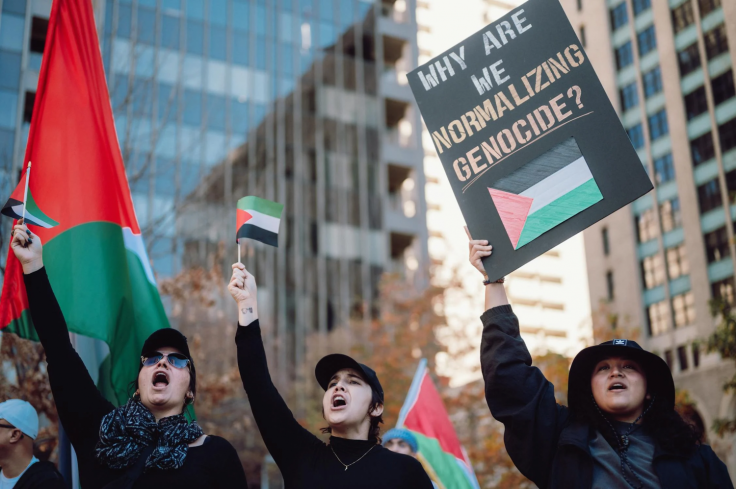On Monday, the University of California, Los Angeles (UCLA) became the epicenter of heated protests and confrontations, culminating in the arrest of two dozen demonstrators.
These protests, organized by the Students for Justice in Palestine (SJP) chapter, were part of a larger movement advocating for Palestinian rights and drawing attention to the ongoing conflict in Gaza. The events of the day not only highlighted the volatile nature of campus activism but also raised serious questions about the response of law enforcement and the university's handling of such incidents.

Protest and Arrests at UCLA
On Monday, the University of California, Los Angeles (UCLA) witnessed significant unrest as two dozen protesters were arrested and subsequently banned from the campus for two weeks. This event was part of a larger wave of demonstrations highlighting the ongoing conflict in Gaza and advocating for Palestinian rights. The protesters, organized by the Students for Justice in Palestine (SJP) chapter at UCLA, roamed the campus, reciting the names of those who had died in Gaza and dyed the waters of the campus's Shapiro Fountain red as a symbolic gesture.
According to the Los Angeles Times, the demonstrators also established several Palestine Solidarity Encampments, continuously relocating to evade police dispersal orders. The university claimed the protesters caused damage to the campus, including tampering with fire safety and electrical equipment. The confrontation between the protesters and campus security culminated in the arrest of the demonstrators, during which six officers were reportedly injured, with one officer suffering a head injury caused by a thrown object.
Allegations of Police Misconduct
The SJP chapter at UCLA has accused the police of using excessive force during the arrests. In a statement on social media, the group claimed that multiple students were injured due to the use of rubber bullets and tear gas by the police. These allegations have intensified the scrutiny surrounding the university's handling of pro-Palestinian protests and the broader discourse on campus safety and freedom of expression.
The use of rubber bullets and tear gas, if confirmed, raises significant concerns about the proportionality of the police response to peaceful protests. The injuries sustained by both protesters and officers highlight the volatile nature of these confrontations and underscore the need for a measured approach in maintaining order while respecting the rights of demonstrators. The SJP's allegations are likely to fuel further debates about police conduct and the appropriate methods for managing campus protests.
Context and Broader Implications
This recent protest is not an isolated incident but part of a series of pro-Palestinian demonstrations at UCLA. Previous events have also been marked by violence and arrests. Notably, a prior encampment by pro-Palestinian activists was attacked by counter-protesters who launched fireworks into the area, leading to over 200 arrests and the subsequent closure of the encampment. These repeated clashes have placed the university in a difficult position, balancing the need to maintain campus safety with the rights of students to protest.
The university's response to these events has drawn criticism from various quarters, including Congress, which has scrutinized UCLA's handling of the protests. The repeated violent confrontations and the university's actions to manage them have sparked a broader debate about the rights of students to express their political views and the responsibilities of institutions to ensure a safe environment.
The situation at UCLA reflects a microcosm of the larger tensions surrounding the Israeli-Palestinian conflict and its impact on academic institutions. Universities across the United States have seen similar protests, often leading to heated debates about free speech, academic freedom, and the role of higher education institutions in political discourse. The increasing polarization and intensity of these protests pose significant challenges for university administrations in navigating the complex landscape of political activism and campus safety.
The arrest of two dozen protesters at UCLA on Monday is the latest episode in a series of pro-Palestinian demonstrations that have sparked significant controversy and debate. The allegations of police misconduct and the injuries sustained by both protesters and officers underscore the challenges in managing such protests. As universities continue to be arenas for political activism, the balance between ensuring safety and upholding the rights to free expression remains a delicate and contentious issue. The events at UCLA serve as a stark reminder of the broader societal conflicts that permeate academic institutions and the ongoing need for thoughtful and measured approaches to campus protests.
© 2025 University Herald, All rights reserved. Do not reproduce without permission.








